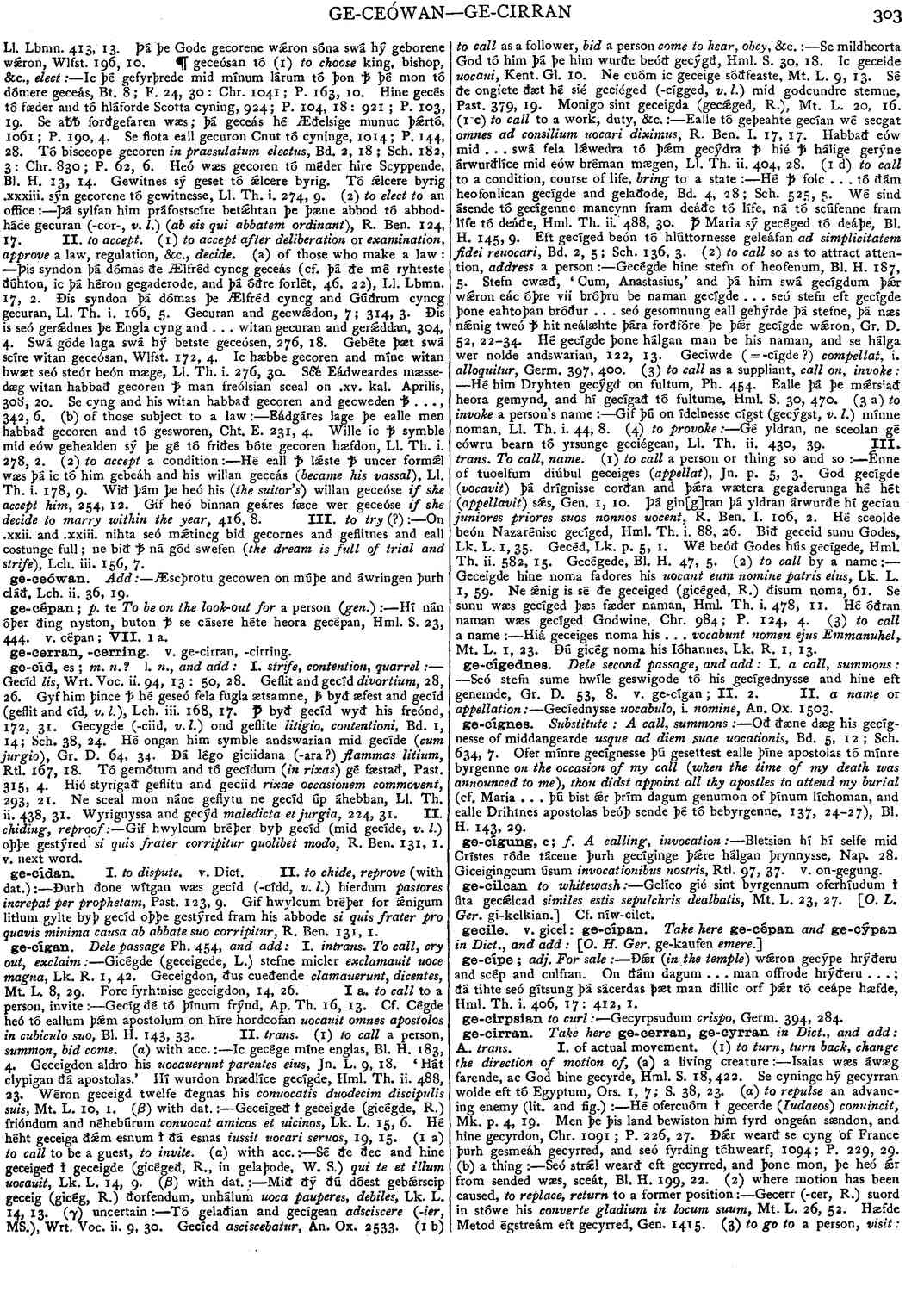ge-cígan
- verb
-
Gicégde (geceigede, L.) stefne micler
exclamauit uoce magna,
- Lk. R. 1, 42.
-
Geceigdon, ðus cueðende
clamauerunt, dicentes,
- Mt. L. 8, 29.
-
Fore fyrhtnise geceigdon, 14, 26. I a.
to call
to a person, invite :-- Gecíg ðé tó þínum frýnd,- Ap. Th. 16, 13.
-
Cf. Cégde heó tó eallum þǽm apostolum on híre hordcofan
uocauit omnes apostolos in cubiculo suo,
- Bl. H. 143, 33.
-
Ic gecége míne englas,
- Bl. H. 183, 4.
-
Geceigdon aldro his
uocauerunt parentes eius,
- Jn. L. 9, 18.
- 'Hát clypigan ðá apostolas.' Hí wurdon hraedlíce gecígde, Hml. Th. ii. 488, 23.
-
Wéron geceigd twelfe ðegnas his
conuocatis duodecim discipulis suis,
- Mt. L. 10, 1.
-
Geceigeð ł geceigde (gicégde, R.) frióndum and néhebúrum
conuocat amicos et uicinos,
- Lk. L. 15, 6.
-
Hé héht geceiga ðǽm esnum ł ðá esnas
iussit uocari seruos,
- 19, 15. (1 a) to call to be a guest, to invite,
-
Sé ðe ðec and hine geceigeð ł geceigde (gicégeð, R., in gelaþode, W.S.)
qui te et illum uocauit,
- Lk. L. 14, 9.
-
Mið ðý ðú dóest gebǽrscip geceig (gicég, R.) ðorfendum, unhálum
uoca pauperes, debiles,
- Lk. L. 14, 13.
-
Tó gelaðian and gecígean
adsciscere (-ier,
- MS.), Wrt. Voc. ii. 9, 30.
-
Gecíed asciscebatur, An. Ox. 2533. (1 b) to call as a follower, bid a person
come to hear, obey,
&c. :-- Se mildheorta God tó him þá þe him wurðe beóð gecýgð,- Hml. S. 30, 18.
-
Ic geceide
uocaui,
- Kent. Gl. 10.
-
Ne cuóm ic geceige sóðfeaste,
- Mt. L. 9, 13.
-
Sé ðe ongiete ðæt hé sié geciéged (-cígged,
v.l.
) mid godcundre stemne,- Past. 379, 19.
-
Monigo sint geceigda (gecǽged, R.), Mt. L. 20, 16. (1 c) to call to a work, duty, &c. :-- Ealle tó geþeahte gecían wé secgat
omnes ad consilium uocari diximus,
- R. Ben. I. 17, 17.
-
Habbað eów mid ... swá fela lǽwedra tó þǽm gecýdra ꝥ hié ꝥ hálige gerýne árwurðlíce mid eów bréman mægen, Ll. Th. ii. 404, 28, (1 d) to call to a condition, course of life,
bring
to a state :-- Hé ꝥ folc ... tó ðám heofonlican gecígde and gelaðode,- Bd. 4, 28; Sch. 525, 5.
-
Wé sind ásende tó gecígenne mancynn fram deáðe tó lífe, ná tó scúfenne fram lífe tó deáðe,
- Hml. Th. ii. 488, 30. ꝥ
-
Eft gecíged beón tó hlúttornesse geleáfan
ad simplicitatem fidei reuocari,
- Bd. 2, 5; Sch. 136, 3.
-
Gecégde hine stefn of heofenum,
- Bl. H. 187, 5.
-
Stefn cwæð, 'Cum,
- Anastasius,' and þá him swá gecígdum þǽr wǽron eác óþre vii bróþru be naman gecígde ... seó stefn eft gecígde þone eahtoþan bróður ... seó gesomnung eall gehýrde þá stefne, þá
-
Hé gecígde þone hálgan man be his naman, and se hálga wer nolde andswarian,
- 122, 13.
-
Geciwde (= -cígde?)
compellat, i. alloquitur,
- Germ. 397, 400.
-
Hé him Dryhten gecýgð on fultum,
- Ph. 454.
-
Ealle þá þe mǽrsiað heora gemynd, and hí gecígað tó fultume, Hml. S. 30, 470. (3 a)
to invoke a person's name :-- Gif þú on ídelnesse cígst (gecýgst, v.l. )
mínne noman,- LI. Th. i. 44, 8.
-
Gé yldran, ne sceolan gé eówru bearn tó yrsunge geciégean,
- Ll. Th. ii. 430, 39.
-
Énne of tuoelfum diúbul geceiges (
appellat
),- Jn. p. 5, 3.
-
God gecígde (
vocavit) þá drígnisse eorðan and þǽra wætera gegaderunga hé hét (appellavit )
sǽs,- Gen. 1. 10.
-
Þá gin[g]ran þá yldran árwurðe hí gecían
juniores priores suos nonnos uocent,
- R. Ben. I. 106, 2.
-
Hé sceolde beón Nazarénisc gecíged,
- Hml. Th. i. 88, 26.
-
Bið geceid sunu Godes,
- Lk. L. 1, 35.
-
Gecéd,
- Lk. p. 5, l. Wé
-
Gecégede,
- Bl. H. 47, 5.
-
Geceigde hine noma fadores his
uocant eum nomine patris eius,
- Lk. L. 1, 59.
- Ne ǽnig is sé ðe geceiged (gicéged. R.) ðisum noma, 61.
- Se sunu wæs gecíged þæs fæder naman. Hml. Th. i. 478, 11.
-
Hé óðran naman wæs gecíged Godwine,
- Chr. 984; P. 124, 4.
-
Hiá geceiges noma his ...
vocabunt women ejus Emmanuhel,
- Mt. L. 1. 23.
-
Ðú gicég noma his Ióhannes,
- Lk. R. 1. 13.
Bosworth, Joseph. “ge-cígan.” In An Anglo-Saxon Dictionary Online, edited by Thomas Northcote Toller, Christ Sean, and Ondřej Tichy. Prague: Faculty of Arts, Charles University, 2014. https://bosworthtoller.com/47445.
Checked: 0